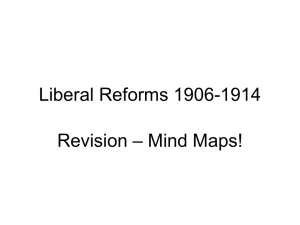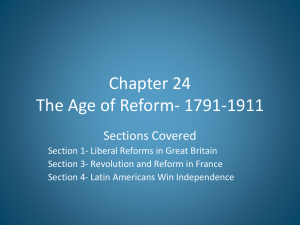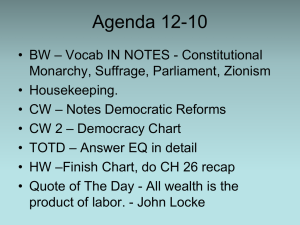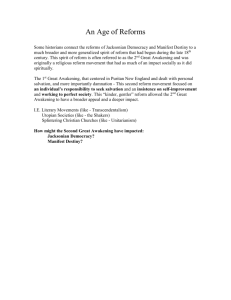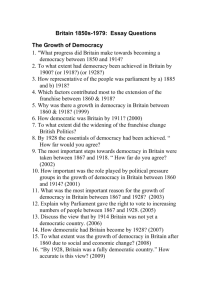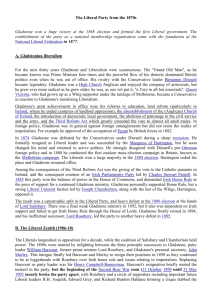Historiography - MarrCollegeHistory
advertisement
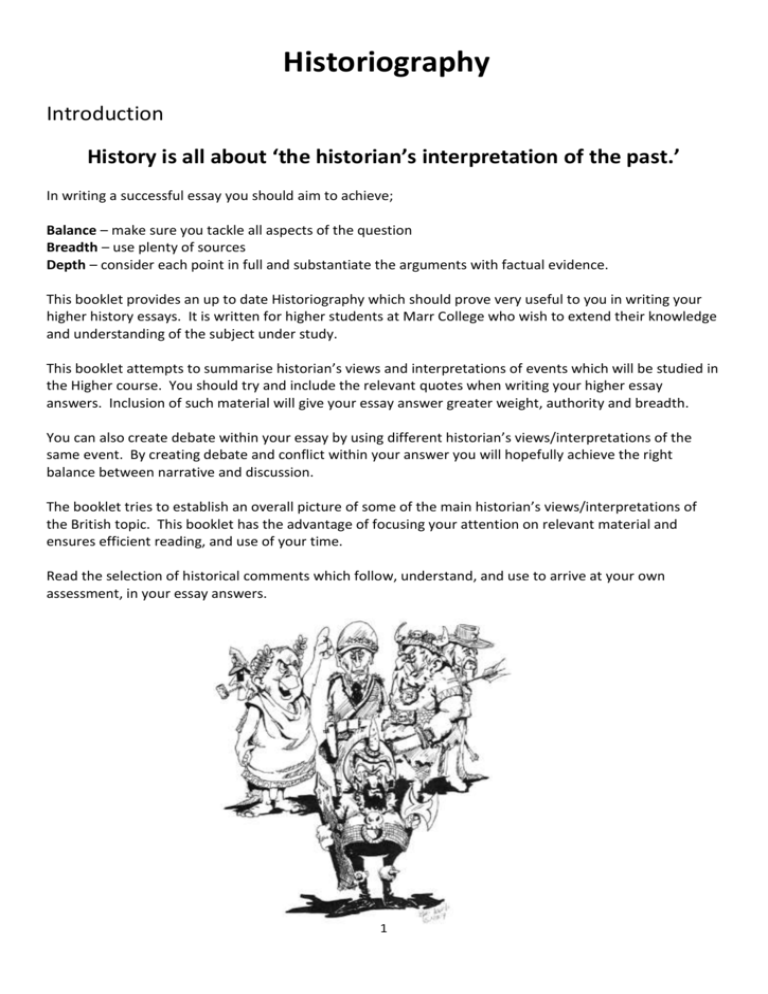
Historiography Introduction History is all about ‘the historian’s interpretation of the past.’ In writing a successful essay you should aim to achieve; Balance – make sure you tackle all aspects of the question Breadth – use plenty of sources Depth – consider each point in full and substantiate the arguments with factual evidence. This booklet provides an up to date Historiography which should prove very useful to you in writing your higher history essays. It is written for higher students at Marr College who wish to extend their knowledge and understanding of the subject under study. This booklet attempts to summarise historian’s views and interpretations of events which will be studied in the Higher course. You should try and include the relevant quotes when writing your higher essay answers. Inclusion of such material will give your essay answer greater weight, authority and breadth. You can also create debate within your essay by using different historian’s views/interpretations of the same event. By creating debate and conflict within your answer you will hopefully achieve the right balance between narrative and discussion. The booklet tries to establish an overall picture of some of the main historian’s views/interpretations of the British topic. This booklet has the advantage of focusing your attention on relevant material and ensures efficient reading, and use of your time. Read the selection of historical comments which follow, understand, and use to arrive at your own assessment, in your essay answers. 1 Democracy A Definition “True democracy is government ‘for’, as well as ‘of’ and ‘by’ the people.” R. Pearce The Significance of the 1832 Reform Act. “The Reform Act placed the feet of the nation firmly in the direction of democracy.” J. R. M. Butler. (1914) Or “The Reform Act was no more than a clumsy hacking at the old structure to make it roughly more acceptable.” Gash (1979) “The Reform Act did not represent any real advance towards democracy.” Vernon (1993) Situation in 1850 “By 1850 there was increased urbanisation, industrialisation and general social change, yet the government of the country was carried out by the middle and upper classes and was elected by a small minority of the population.” D. Morrison Pressure for Reform in 1860’s. “The artisans (skilled workers) are almost to man red hot politicians.” “The artisans are sufficiently educated and thoughtful to have a sense of their importance in the state.” “The unskilled workers... appear to have no political opinions whatever.” Henry Mayhew journalist (1861-62) Outside Influences “It may be that the American Civil War encouraged renewed discussion of political rights.” S. Wood Significance of 1867 Reform Act “The 1867 Act led to a significant widening of the borough franchise, bringing within the ‘pale of the constitution’ many working class men who had previously been considered unfit for involvement in political life.” B. Whitefield 1872 Secret Ballot Act Not all were in favour of this act. “The motives under which men act in secret are, as a general rule, inferior to those under which men act in public.” David L. Keir Or 2 “The workers were now able to use their vote freely without fear of reprisals from employer or landlord. Public opinion came to be more of a reality in politics.” D. Thomson Where voters were very numerous the secret ballot made a difference. “Since the passing of the Ballot Act we have never had the slightest trouble at any election that has taken place in London.” Chief Commissioner of Police 1874. Third Reform Act 1884 Has been described by some as “A bold and logical measure granting manhood suffrage in town and country alike.” T. C. Smout “Parliament would have to govern the country with an eye to the interests and wishes of the majority of the people.” Cole and Postgate Or “The act left some 40% of the adult males in the UK still disenfranchised in 1911.” T. C. Smout Gladstone in 1884 declared, “Is there any doubt that the peasantry of the country are capable citizens, qualified for enfranchisement, qualified to make good use of their power as voters?” “Elected by five million men, of whom 60% belong to the labouring classes. It is a revolution which has been peacefully and silently accomplished. The centre of power has been sifted.” Joseph Chamberlain 1911 Parliament Act “The act was of major importance in the development of the constitution... democracy was safeguarded..an important step in the reduction of the powers of the aristocracy.” N. Lowe 1918 Representation of the People Act “The act failed to reward a significant proportion of the women for their war effort.” T. Monaghan Conclusion “The essence of democracy is that of a system of government which promotes and encourages political change from below.” D. Morrison “The vote was discussed chiefly as a kind of personal reward or certificate of good character, never an instrument for changing the social condition of the people.” Vincent (1972) “The development of liberal democracy in Britain has been slow and piecemeal.” E. Morrison 3 Votes for Women Reasons Against Women Gaining Vote “Once they opened the door and enfranchised ever so small a number of females, they could not possibly close it.” “The government of the country would be handed over to a majority who would not be men, but women.” “Women are creatures of impulse and emotion and did not decide questions on the ground of reason as men did.” William Randall Cremer (MP) “Check this mad, wicked folly." Queen Victoria On Militancy “We have touched the limit of public demonstration ... Nothing but militant action is left to us now.” Pethick Lawrence Did the Pankhurst tactics of militancy work? “The WSPU revitalised the question of voted for women with its tactics of political confrontations and the immense publicity that ensued.” M. MacKenzie Martin Pugh disagrees “The Pankhurst were a divisive force within the women’s movement. There are no grounds for the view that the WSPU shifted public opinion in its favour, rather than the reverse.” The War “In many ways the war may have delayed the franchise rather than expedited it.” J. Hinton “It might even be that the war postponed such a victory.” J. Holton “The pre-war suffrage movement prepared the ground for votes for women.” P. Bartley “The sacrifices of the munitions workers in particular, granted them suffrage as recompense for their efforts.” P. Bartley “It is difficult to see how women could have achieved so much ... without the unique circumstances arising from the war.” E. Winkler 4 Pugh and Holton argued that support for women’s suffrage was growing in the Liberal Party before the war. “Women would have expected to gain the vote by 1918, if a Liberal government had been returned in the general election due in late 1914 or 1915.” From War to Equal Voting Rights “The women’s suffrage movement lost its impetus, and its leaders went their separate ways.” J. Maclean “Women were performing arduous and worthwhile tasks ... they gained a new self consciousness and a new sense of status.” A. Marwick “Some measure of women’s suffrage should be conferred.” Speakers Conference Jan. 1917 “Women’s war work converted some former opponents and provided others with a face saving excuse to alter their positions.” J. Holton “Women were enfranchised because the war had changed masculine perceptions about women’s role in society.” P. Bartley “Women’s war effort succeeded where the suffragette campaign failed.” Ray “War smoothed the way for democracy.” A. J. P. Taylor 5 The Movement Away From Laissez-Faire “Laissez-faire ... is quite done with.” Robertson Liberal MP Motives for the Liberal Reforms Social Investigations of Booth and Rowntree Social investigators such as Booth and Rowntree “focused attention on the deep-seated reasons for deprivation, about which poor people could do little unaided: low wages, sickness, old age, raising children”. Graham Goodlad “New Liberalism was given a powerful impetus by the revelations of Booth and Rowntree”. Peter Murray National Efficiency “Arguably, the single most important precondition for the spate of social reforms between 1906 and 1914 was fear of the consequences of an unfit and debilitated population”. Eric Evans “What is all our wealth and learning and the finest flower of our civilisation and constitution ... if the men and women on whose labour the whole social fabric is maintained are doomed to live and die in darkness and misery”. Campbell-Bannerman (Liberal Prime Minister 1905-1908) “The success of foreign economies suggested that the British workforce was inferior to that of the foreign rivals the Nation faced. The work of Booth and Rowntree, by revealing the depths of poverty in English cities, reinforced this concern”. Peter Murray National Security “A vast population has been created by the factory and industrial systems, the majority of whom is incapable of bearing arms”. A. White “The high proportion of army volunteers from the large towns rejected as physically unfit appeared to confirm the alarming findings of Booth and Rowntree”. A. Sykes New Liberalism “New Liberalism stood for increased taxes on the rich in order to finance state intervention on behalf of the poor”. Peter Murray “I see little glory in an Empire which can rule the waves and is unable to flush its sewers”. Winston Churchill “The cause of the Liberal Party is the cause of the left-out millions”. Winston Churchill “After all, this is a rich country. It is the richest country under the sun; and yet in this rich country you have hundreds and thousands of people living under conditions of poverty, destitution and squalor that would, in the words of an old Welsh poet, make the rocks weep”. David Lloyd George 6 “It was Lloyd George and Churchill in partnership who carried Asquith’s Government forward into a progressive and active social policy”. Derek Fraser Rise of the Labour Party / Political Advantage “Some reforms ... can be directly traced to Labour Party pressure. Fear of ‘socialism’ may well have encouraged the Liberals to bring forward their own reforms, so that there would be no need for the masses to turn to Labour”. Graham Goodlad “The 1906 election provided the Liberals with the chance to show that there was a party of concern and conscience which could legislate in the interest of the poor and that there was no need for a party designated to this one sole interest in society”. Derek Fraser “Political historians have commonly seen the Liberals’ reforms of 1906-14 as a pragmatic and doomed attempt at propping up their increasingly threatened position on the left of British politics”. Duncan Tanner The Liberal Reforms Children’s Reforms “Much of the State’s activity in connection with children ... was resented by parents as an infringement of their role.” M. Pugh “90% of children had defective teeth ... 9% suffered from rickets ... 30% were verminous.” Medical Officer for Glasgow “Provision should be made for regular inspection of school children.” Royal Commission 1904 Old Age Pensions “Old folk, spending their allowance in a shop would bless the name of Lloyd George as if he were a saint from heaven.” Quoted in R. Roberts, The Classic Slum “As they picked up their money they would say, God Bless Lloyd George.” D. Morrison A. J. P. Taylor “The state provided a meagre pension for the needy over 70.” Martin Pugh “The social reforms were in no sense a welfare state ... they were not intended as a uniform system of welfare provision. Rather, they involved targeting certain discrete parts of the problem of poverty.” State and Society National Insurance “The provision made for the sick and unemployed is grossly inadequate in this country.” 7 Lloyd George 15th June 1908 Assessment of the Liberal Reforms “The Liberal government returned in1906 had no clearly defined social programme.” L. Petheram The Liberal reforms added up to; “A significant shift away from minimum government in the laissez-faire tradition.” D. Morrison “The working classes were not wholeheartedly in favour of the efforts made on their behalf by the Liberals.” E. Morrison They viewed “the insurance schemes as little more than middle class interference.” T. Monaghan “Asquith’s administration laid the foundations of the Welfare State by taking responsibility for the most vulnerable groups in society and financing means to help them.” L. Petheram Other historians disagree “They argue that the Liberal reforms were very limited in scope and failed to deal with such important welfare issues as education and housing.” D. Morrison “Lloyd George and Churchill saw their reforms as first steps, which were brought to a halt by the Great War.” T. Monaghan 8 The Labour Government 1945-51 Beveridge Report “The scheme is in some ways a revolution, but in more ways it is a natural development of the past.” (Beveridge) “All this amounted to no revolutionary proposal. The Beveridge Plan ... rounded off and carried to their logical conclusion all of the established services.” M. Bruce “The decisive event in the evolution of the Welfare State was the Second World War.” M. Bruce “The war was to have a decisive influence in producing a common experience and universal treatment for all.” D. Fraser Impact of the Labour Government of 1945-51 The Labour Government after the Second World War created much controversy. “There had undoubtedly been important social reforms. But power had not shifted between the classes. Qualitative social transformation had not come.” D. Coates (1975) “It was the most effective of any British Government since the passage of the 1832 Reform Act.” K. Morgan Labour Government Achievements “The major achievement of the Labour Party after 1945 was to complete and consolidate the work of the wartime coalition.” David Dutton Kathleen Woodroofe noted; “How state action created a system, in which welfare support was believed to be a right, free of the shame of the old poor law.” 9
